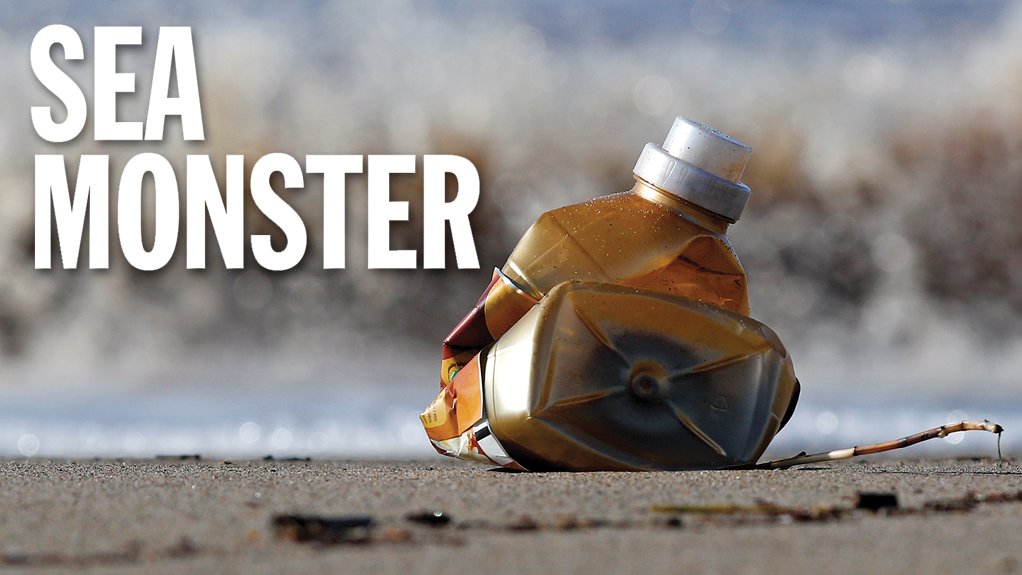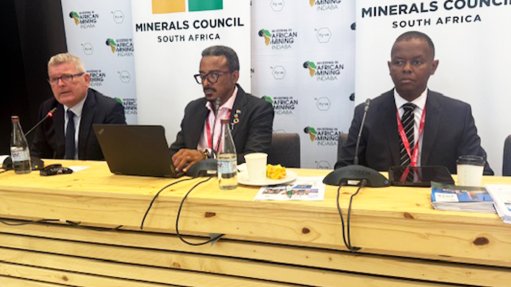Holistic strategy needed to tackle growing marine plastic crisis
As the marine ecosystem plays an critical role in mitigating climate change, through absorbing carbon dioxide (CO2), cooling the environment and sustaining delicate marine wildlife, it is becoming increasingly important to mitigate a mounting problem – the leakage of plastic waste into oceans and seas.
To illustrate the gravity of the situation in South Africa, World Wide Fund for Nature (WWF) environmental behaviour change practitioner and WWF Southern African Sustainable Seafood Initiative manager Pavitray Pillay says about 107 000 t of plastic waste finds its way into the country’s oceans and main rivers every year. This is because 49% of all local plastic waste is mismanaged, and, of the 70% collected, only 14% is actually recycled.
Globally, she says, about 22% of plastic pollution in oceans is attributable to dumping by ships, with some of it being abandoned or lost fishing gear, while the vast majority comprises plastic waste that is transported through rivers, stormwater drains or wastewater discharge infrastructure.
The world’s oceans are essential for the survival of humans and animals alike, as they produce 70% of the world’s oxygen, absorb vast amounts of CO2 and drive the Earth’s weather systems, thereby shaping regional climates and associated weather patterns. It is, therefore, important that efforts to tackle the marine waste challenge are redoubled to mitigate current degradation and accelerate the oceans’ recovery.
A report published by the International Union for Conservation of Nature in December 2020 points out that the country generates 2.37-million tonnes of plastic waste each year.
The WWF explains that plastic pollution is commonly viewed through a marine-litter lens because the oceans comprise one of the largest ‘sinks’ (or destinations) for plastics, especially single-use plastics, at the end of their life.
According to the organisation, at least eight-million tonnes of plastics are dumped into the oceans every year, equivalent to a garbage truck that is fully laden with plastics dumping into the ocean every minute.
Environmental Impact
The WWF notes that more creatures live in oceans than on land, with upwards of 12 000 marine species inhabiting South African waters. Therefore, it is important to ensure the oceans remain free of items that endanger ocean life and associated natural processes.
Another significant contributor to marine plastic waste globally is commercial fishing gear, such as nets made of synthetic fibres (plastics), plastic fishing lines, and plastic ropes and buoys, which get lost or are abandoned at an alarming rate. Indeed, international nonprofit marine conservation organisation Sea Shepherd, which is active in many parts of the world, estimates that almost 50% of global marine plastics come from discarded fishing gear, and that consuming less seafood would significantly reduce the volume of fishing gear that is lost or abandoned in the oceans.
Drifting fishing gear poses a particular threat to marine life, as it entangles animals, from small fish to turtles, sharks and dolphins, as well as the largest mammals – whales. Nets also easily disintegrate into plastic microfibres, thus contributing to the vast volumes of such matter present in the oceans.
Pillay, however, tells Engineering News & Mining Weekly that South Africa’s commercial fishing industry contributes less to gear loss and abandonment than the larger fishing industries of other countries.
She adds that some of the larger South African commercial fishing operations have gear-retrieval processes and voluntary gear marking in place.
Pillay explains that plastic items are also often mistaken by marine wildlife for food. This is especially the case with lentil-sized plastic pellets, otherwise known as “nurdles”, a source of primary micro- or meso-plastics that are leaked into the environment if mismanaged during processing or transport.
There have been cases of nurdles leaking into the environment in South Africa, with one of the major, more recent incidents involving a ship losing two containers carrying 49 t of polyethylene nurdles in the Port of Durban on October 10, 2017.
At the time, the Department of Forestry, Fisheries and the Environment said the nurdles posed a particular threat to seabirds and turtles, which would likely mistake the nurdles for small eggs and eat them. The department said that, once ingested, the nurdles could prevent the gills of fish from functioning properly.
Further, high volumes of plastics that float prevent microplankton from photosynthesising and light from penetrating the oceans, says Pillay.
“Macro-plastics also reduce the exchange of oxygen and the delivery of sediments to the seafloor, with impacts such as reduced abundance and productivity of benthic marine life.”
Pillay adds that certain plastics that often contain toxic additives that leach into the oceans are also toxic to marine life.
Meanwhile, the production of plastics relies heavily on fossil fuel inputs, thereby causing “significant climate change impacts at every stage of the value chain, from production to disposal”, she says.
Thus, Pillay notes that the projected expansion in plastic production to meet an exponential increase in consumption will significantly increase the plastics sector’s contribution to global greenhouse-gas emissions, from 4% in 2015 to 15% by 2050.
Tip of the Iceberg
Of the most leaked types of plastic, low- density polyethylene (LDPE) ranks the highest, as this material is used in 70% of packaging products, which have a higher chance of leakage because they are discarded after being used only once.
Polypropylene follows closely.
Owing to different ocean currents converging in certain areas, gyres gather vast amounts of marine plastic in specific locations, one of which is the so-called Great Pacific Garbage Patch. This visually illustrates only a fraction of the bigger problem, as much more plastic waste lies below the water line, while other plastic items eventually sink to the ocean floor.
Plastics such as LDPE, high-density polyethylene and polypropylene, comprising about 60% of total plastics production in South Africa, float in water. However, denser plastics, such as polyethylene terephthalate and polyvinyl chloride, do sink, and either get suspended in the water column or settle on the seafloor.
Further, although shorelines have a high concentration of visible plastics, shoreline plastics are estimated to account for only about 5% of the total mass of plastics in the ocean, according to the WWF.
This was evidenced by a study involving 235 dermesal trawls – which catch fish along, or just above, the seafloor – that was conducted off the coast of South Africa. Seventeen per cent of trawls returned litter, points out the WWF in a November 2020 report. About 88% of this litter comprised plastic items, of which 22% were fishing- related items, while the remainder comprised plastic packaging.
Solutions
Pillay says that, over the past 24 months, there has been a significant improvement in awareness among retailers and suppliers and, to some extent, the plastics industry, of the issue of plastic waste entering the marine environment.
“We have seen the establishment of initiatives such as the South African Plastic Pact to start addressing the issue at a systems level, upstream and downstream.”
The pact was launched in January 2020.
Pillay says it is encouraging that there is significant awareness among South Africans about the problem that plastics and plastic waste pose to the marine environment, and that there is a definite drive towards wanting to help stem the tide.
WWF points to mounting evidence that recycling is only one of the many solutions that may be deployed to curb the problem, noting that other circular economy measures should be embraced as well.
These include the elimination of unnecessary and problematic plastic items, and the promotion of products designed for reuse, as well as new product delivery models, such as own-container and/or reusable-container consumable dispensing schemes.
The WWF also says biodegradable materials should be regarded with caution, as they are currently unsuitable for the South African recycling context, owing to a lack of infrastructure for effective separation, collection and treatment at industrial composting facilities.
The organisation explains that not all biodegradable plastics biodegrade in the traditional sense, such as through natural processes, and may require external intervention.
Biodegradable materials also pose the risk of contaminating the conventional plastics recycling stream, the WWF notes.
Meanwhile, many other solutions to minimise the amount of plastic waste entering the oceans and to remove plastics already in the oceans are under consideration. In South Africa, the Litterboom – a simple solution that uses a floating pipe to trap floating waste in rivers to lessen the volume of waste ending up in the ocean – has been trialled.
The Overstrand municipality, in the Western Cape, in partnership with Marine Dynamics and Dyer Island Conservation Trust, has also fitted nets onto stormwater drains to catch litter before it enters the sea. The municipality also painted signs on stormwater drains that state: “Don’t litter. The sea starts here.” This is intended to dissuade people from littering and to make them realise that litter going into stormwater drains will most likely end up in the sea.
To help combat the problem, WWF South Africa has initiated its plastics programme that focuses on transitioning from a linear to a circular economy. In this model, plastics are more valued, remain within the economy, pollute less and have fewer negative impacts on society and the economy.
“By addressing plastics pollution at a systemic level, including strengthening policies regarding plastics production and use, and by advocating for accountability from businesses that produce and place plastics on the market, we believe that this will lead to abating leakage into the natural environment,” concludes Pillay.
Article Enquiry
Email Article
Save Article
Feedback
To advertise email advertising@creamermedia.co.za or click here
Comments
Press Office
Announcements
What's On
Subscribe to improve your user experience...
Option 1 (equivalent of R125 a month):
Receive a weekly copy of Creamer Media's Engineering News & Mining Weekly magazine
(print copy for those in South Africa and e-magazine for those outside of South Africa)
Receive daily email newsletters
Access to full search results
Access archive of magazine back copies
Access to Projects in Progress
Access to ONE Research Report of your choice in PDF format
Option 2 (equivalent of R375 a month):
All benefits from Option 1
PLUS
Access to Creamer Media's Research Channel Africa for ALL Research Reports, in PDF format, on various industrial and mining sectors
including Electricity; Water; Energy Transition; Hydrogen; Roads, Rail and Ports; Coal; Gold; Platinum; Battery Metals; etc.
Already a subscriber?
Forgotten your password?
Receive weekly copy of Creamer Media's Engineering News & Mining Weekly magazine (print copy for those in South Africa and e-magazine for those outside of South Africa)
➕
Recieve daily email newsletters
➕
Access to full search results
➕
Access archive of magazine back copies
➕
Access to Projects in Progress
➕
Access to ONE Research Report of your choice in PDF format
RESEARCH CHANNEL AFRICA
R4500 (equivalent of R375 a month)
SUBSCRIBEAll benefits from Option 1
➕
Access to Creamer Media's Research Channel Africa for ALL Research Reports on various industrial and mining sectors, in PDF format, including on:
Electricity
➕
Water
➕
Energy Transition
➕
Hydrogen
➕
Roads, Rail and Ports
➕
Coal
➕
Gold
➕
Platinum
➕
Battery Metals
➕
etc.
Receive all benefits from Option 1 or Option 2 delivered to numerous people at your company
➕
Multiple User names and Passwords for simultaneous log-ins
➕
Intranet integration access to all in your organisation





















